Information Literacy Plan and Reflective Practice Analysis
VerifiedAdded on 2021/01/01
|12
|3298
|83
Report
AI Summary
This report presents an information literacy plan, exploring its application within an educational context. It examines the importance of information literacy in fostering effective student learning, emphasizing the role of the teacher librarian and the information process model. The report provides an overview of an inquiry unit of work and a lesson plan, highlighting the general capabilities required by teacher librarians. Furthermore, it includes a reflective practice section, analyzing the practical implementation of the information literacy plan and the impact of inquiry learning on student access to knowledge. The report underscores the significance of strategic planning and the utilization of various resources, including technology, to facilitate optimal learning outcomes. Finally, the report concludes with a critical reflection on the discussed concepts and their practical implications.
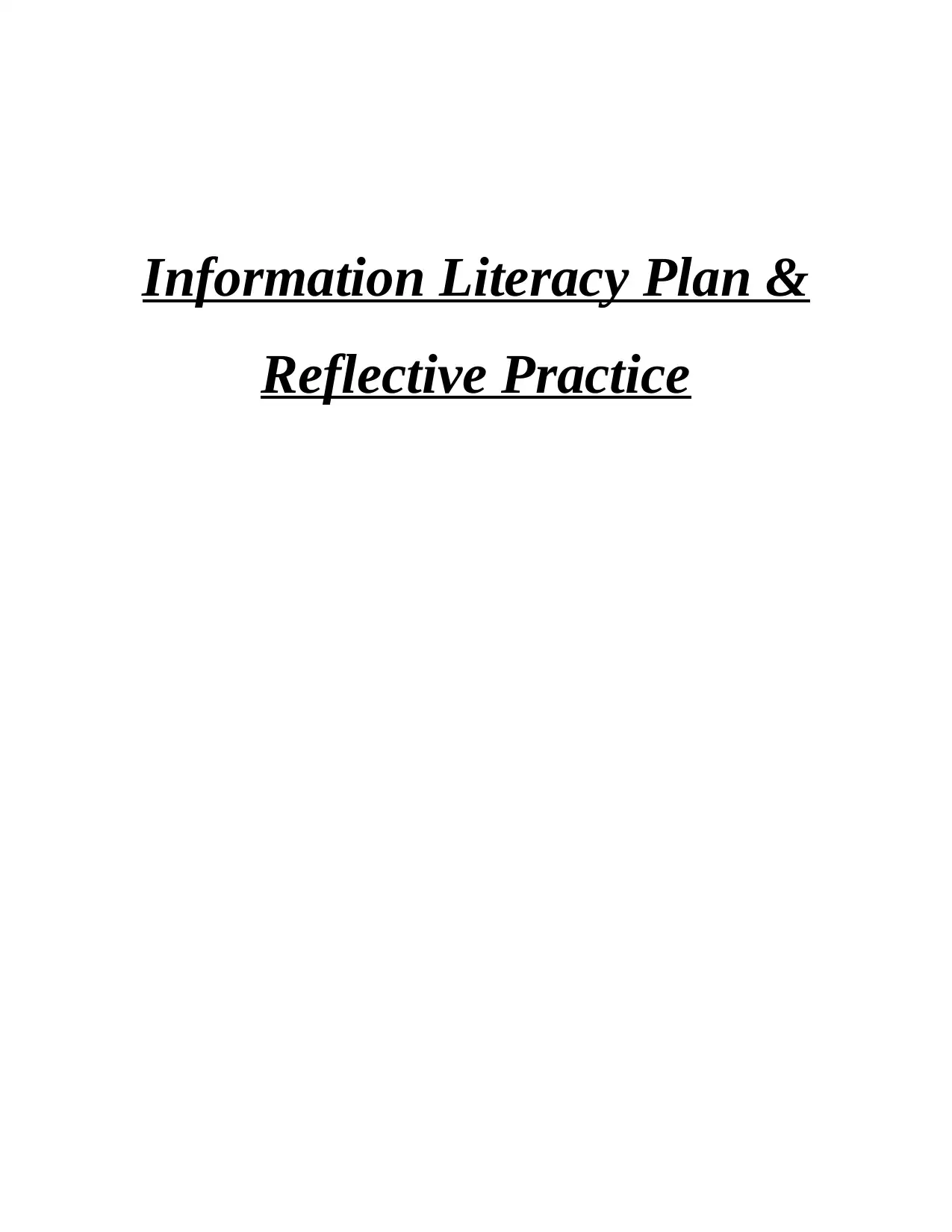
Information Literacy Plan &
Reflective Practice
Reflective Practice
Paraphrase This Document
Need a fresh take? Get an instant paraphrase of this document with our AI Paraphraser
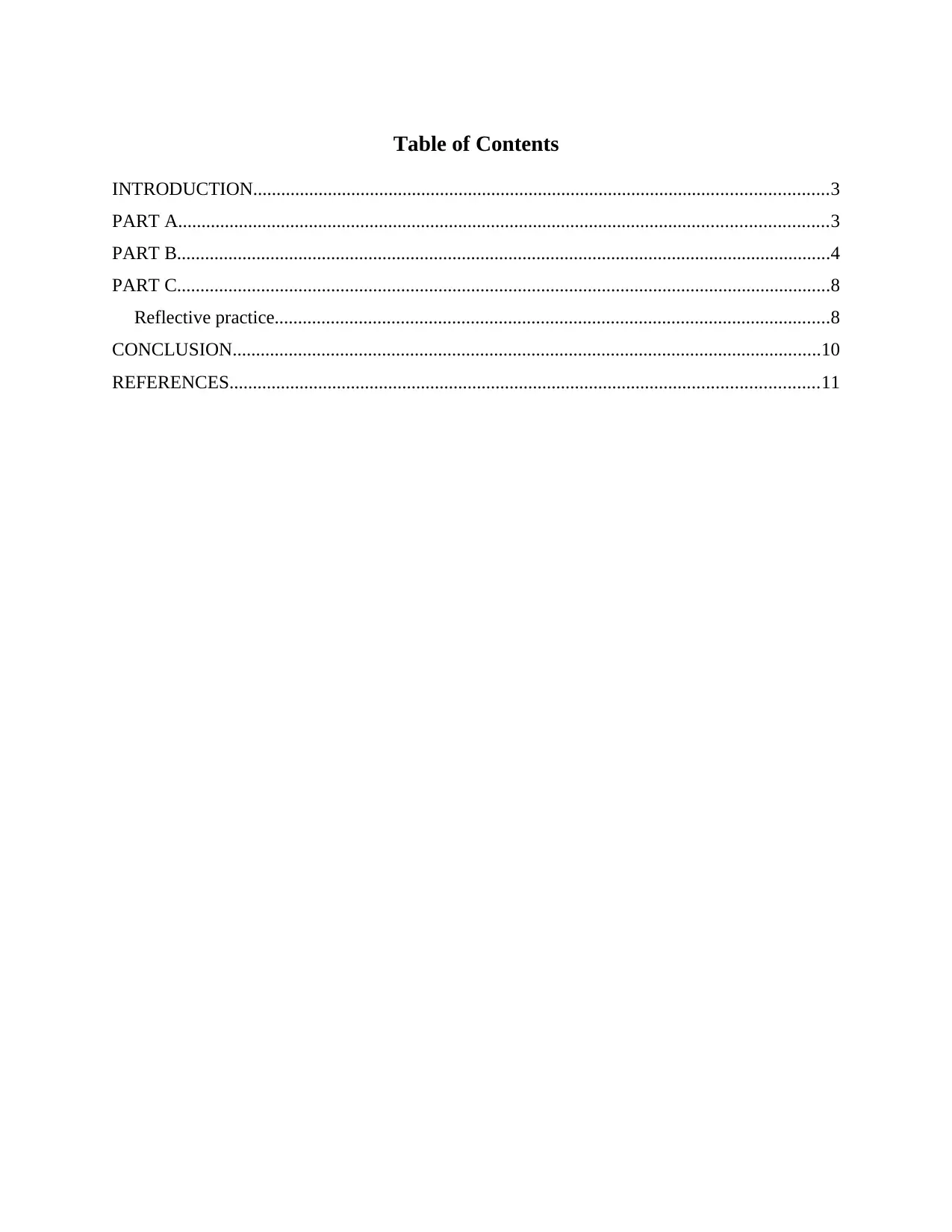
Table of Contents
INTRODUCTION...........................................................................................................................3
PART A...........................................................................................................................................3
PART B............................................................................................................................................4
PART C............................................................................................................................................8
Reflective practice.......................................................................................................................8
CONCLUSION..............................................................................................................................10
REFERENCES..............................................................................................................................11
INTRODUCTION...........................................................................................................................3
PART A...........................................................................................................................................3
PART B............................................................................................................................................4
PART C............................................................................................................................................8
Reflective practice.......................................................................................................................8
CONCLUSION..............................................................................................................................10
REFERENCES..............................................................................................................................11
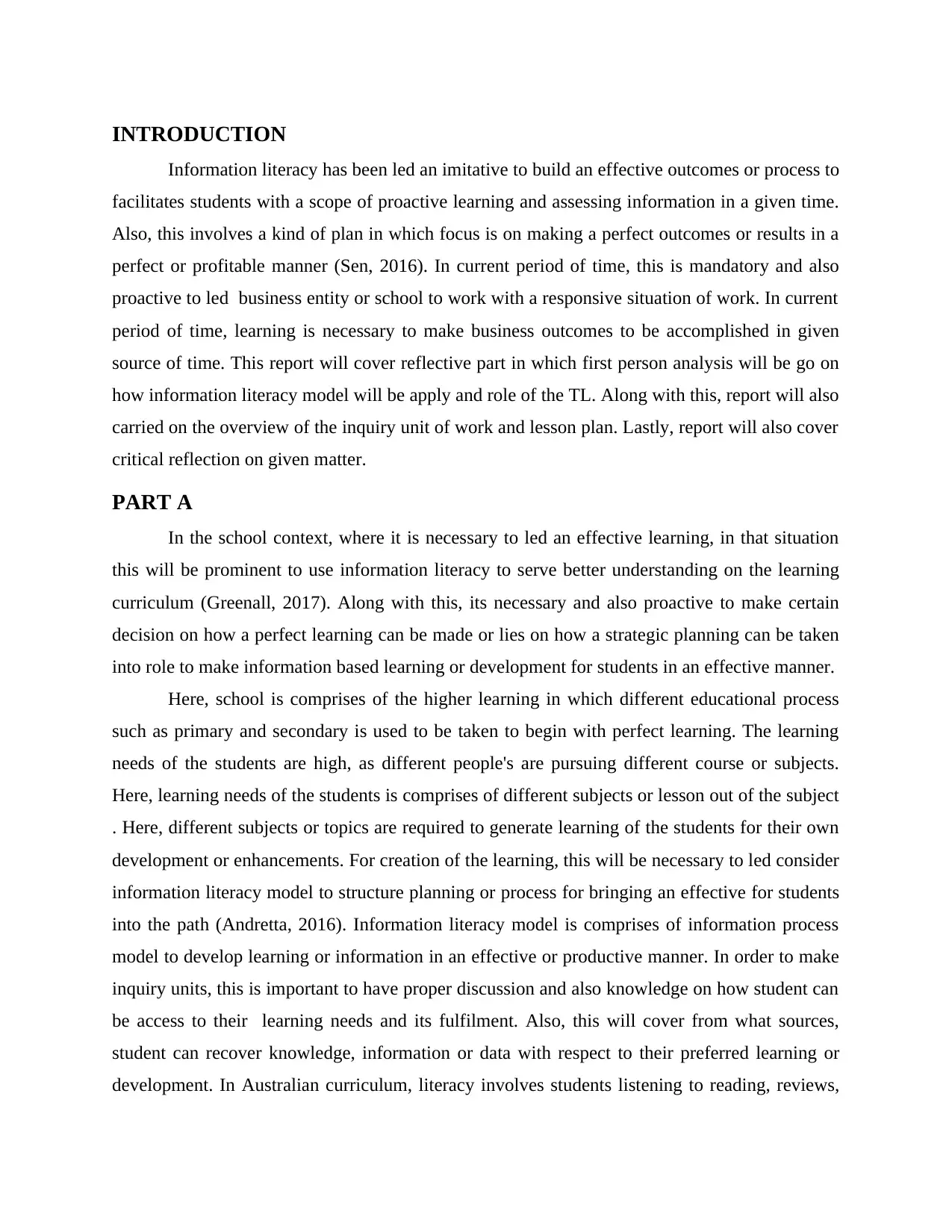
INTRODUCTION
Information literacy has been led an imitative to build an effective outcomes or process to
facilitates students with a scope of proactive learning and assessing information in a given time.
Also, this involves a kind of plan in which focus is on making a perfect outcomes or results in a
perfect or profitable manner (Sen, 2016). In current period of time, this is mandatory and also
proactive to led business entity or school to work with a responsive situation of work. In current
period of time, learning is necessary to make business outcomes to be accomplished in given
source of time. This report will cover reflective part in which first person analysis will be go on
how information literacy model will be apply and role of the TL. Along with this, report will also
carried on the overview of the inquiry unit of work and lesson plan. Lastly, report will also cover
critical reflection on given matter.
PART A
In the school context, where it is necessary to led an effective learning, in that situation
this will be prominent to use information literacy to serve better understanding on the learning
curriculum (Greenall, 2017). Along with this, its necessary and also proactive to make certain
decision on how a perfect learning can be made or lies on how a strategic planning can be taken
into role to make information based learning or development for students in an effective manner.
Here, school is comprises of the higher learning in which different educational process
such as primary and secondary is used to be taken to begin with perfect learning. The learning
needs of the students are high, as different people's are pursuing different course or subjects.
Here, learning needs of the students is comprises of different subjects or lesson out of the subject
. Here, different subjects or topics are required to generate learning of the students for their own
development or enhancements. For creation of the learning, this will be necessary to led consider
information literacy model to structure planning or process for bringing an effective for students
into the path (Andretta, 2016). Information literacy model is comprises of information process
model to develop learning or information in an effective or productive manner. In order to make
inquiry units, this is important to have proper discussion and also knowledge on how student can
be access to their learning needs and its fulfilment. Also, this will cover from what sources,
student can recover knowledge, information or data with respect to their preferred learning or
development. In Australian curriculum, literacy involves students listening to reading, reviews,
Information literacy has been led an imitative to build an effective outcomes or process to
facilitates students with a scope of proactive learning and assessing information in a given time.
Also, this involves a kind of plan in which focus is on making a perfect outcomes or results in a
perfect or profitable manner (Sen, 2016). In current period of time, this is mandatory and also
proactive to led business entity or school to work with a responsive situation of work. In current
period of time, learning is necessary to make business outcomes to be accomplished in given
source of time. This report will cover reflective part in which first person analysis will be go on
how information literacy model will be apply and role of the TL. Along with this, report will also
carried on the overview of the inquiry unit of work and lesson plan. Lastly, report will also cover
critical reflection on given matter.
PART A
In the school context, where it is necessary to led an effective learning, in that situation
this will be prominent to use information literacy to serve better understanding on the learning
curriculum (Greenall, 2017). Along with this, its necessary and also proactive to make certain
decision on how a perfect learning can be made or lies on how a strategic planning can be taken
into role to make information based learning or development for students in an effective manner.
Here, school is comprises of the higher learning in which different educational process
such as primary and secondary is used to be taken to begin with perfect learning. The learning
needs of the students are high, as different people's are pursuing different course or subjects.
Here, learning needs of the students is comprises of different subjects or lesson out of the subject
. Here, different subjects or topics are required to generate learning of the students for their own
development or enhancements. For creation of the learning, this will be necessary to led consider
information literacy model to structure planning or process for bringing an effective for students
into the path (Andretta, 2016). Information literacy model is comprises of information process
model to develop learning or information in an effective or productive manner. In order to make
inquiry units, this is important to have proper discussion and also knowledge on how student can
be access to their learning needs and its fulfilment. Also, this will cover from what sources,
student can recover knowledge, information or data with respect to their preferred learning or
development. In Australian curriculum, literacy involves students listening to reading, reviews,
⊘ This is a preview!⊘
Do you want full access?
Subscribe today to unlock all pages.

Trusted by 1+ million students worldwide
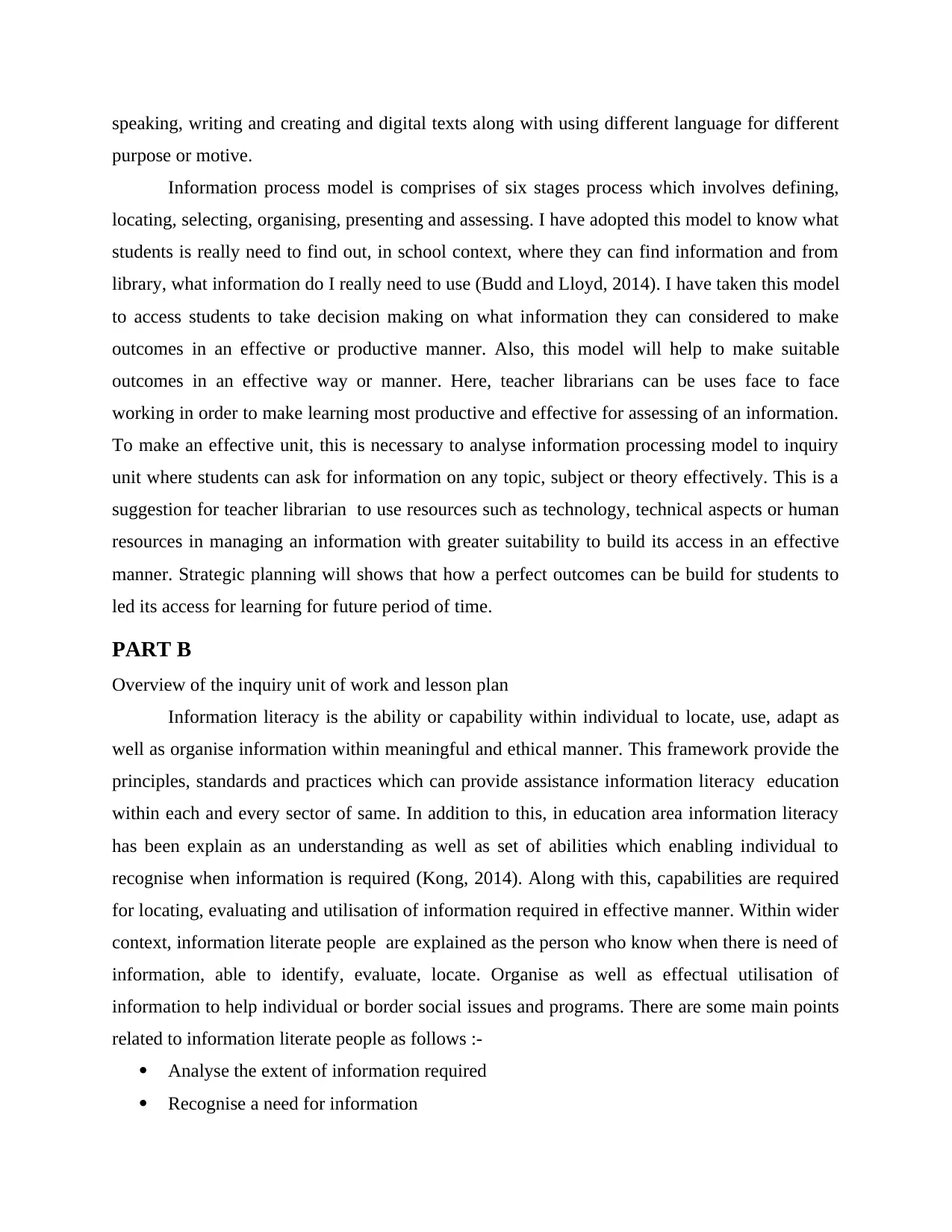
speaking, writing and creating and digital texts along with using different language for different
purpose or motive.
Information process model is comprises of six stages process which involves defining,
locating, selecting, organising, presenting and assessing. I have adopted this model to know what
students is really need to find out, in school context, where they can find information and from
library, what information do I really need to use (Budd and Lloyd, 2014). I have taken this model
to access students to take decision making on what information they can considered to make
outcomes in an effective or productive manner. Also, this model will help to make suitable
outcomes in an effective way or manner. Here, teacher librarians can be uses face to face
working in order to make learning most productive and effective for assessing of an information.
To make an effective unit, this is necessary to analyse information processing model to inquiry
unit where students can ask for information on any topic, subject or theory effectively. This is a
suggestion for teacher librarian to use resources such as technology, technical aspects or human
resources in managing an information with greater suitability to build its access in an effective
manner. Strategic planning will shows that how a perfect outcomes can be build for students to
led its access for learning for future period of time.
PART B
Overview of the inquiry unit of work and lesson plan
Information literacy is the ability or capability within individual to locate, use, adapt as
well as organise information within meaningful and ethical manner. This framework provide the
principles, standards and practices which can provide assistance information literacy education
within each and every sector of same. In addition to this, in education area information literacy
has been explain as an understanding as well as set of abilities which enabling individual to
recognise when information is required (Kong, 2014). Along with this, capabilities are required
for locating, evaluating and utilisation of information required in effective manner. Within wider
context, information literate people are explained as the person who know when there is need of
information, able to identify, evaluate, locate. Organise as well as effectual utilisation of
information to help individual or border social issues and programs. There are some main points
related to information literate people as follows :-
Analyse the extent of information required
Recognise a need for information
purpose or motive.
Information process model is comprises of six stages process which involves defining,
locating, selecting, organising, presenting and assessing. I have adopted this model to know what
students is really need to find out, in school context, where they can find information and from
library, what information do I really need to use (Budd and Lloyd, 2014). I have taken this model
to access students to take decision making on what information they can considered to make
outcomes in an effective or productive manner. Also, this model will help to make suitable
outcomes in an effective way or manner. Here, teacher librarians can be uses face to face
working in order to make learning most productive and effective for assessing of an information.
To make an effective unit, this is necessary to analyse information processing model to inquiry
unit where students can ask for information on any topic, subject or theory effectively. This is a
suggestion for teacher librarian to use resources such as technology, technical aspects or human
resources in managing an information with greater suitability to build its access in an effective
manner. Strategic planning will shows that how a perfect outcomes can be build for students to
led its access for learning for future period of time.
PART B
Overview of the inquiry unit of work and lesson plan
Information literacy is the ability or capability within individual to locate, use, adapt as
well as organise information within meaningful and ethical manner. This framework provide the
principles, standards and practices which can provide assistance information literacy education
within each and every sector of same. In addition to this, in education area information literacy
has been explain as an understanding as well as set of abilities which enabling individual to
recognise when information is required (Kong, 2014). Along with this, capabilities are required
for locating, evaluating and utilisation of information required in effective manner. Within wider
context, information literate people are explained as the person who know when there is need of
information, able to identify, evaluate, locate. Organise as well as effectual utilisation of
information to help individual or border social issues and programs. There are some main points
related to information literate people as follows :-
Analyse the extent of information required
Recognise a need for information
Paraphrase This Document
Need a fresh take? Get an instant paraphrase of this document with our AI Paraphraser
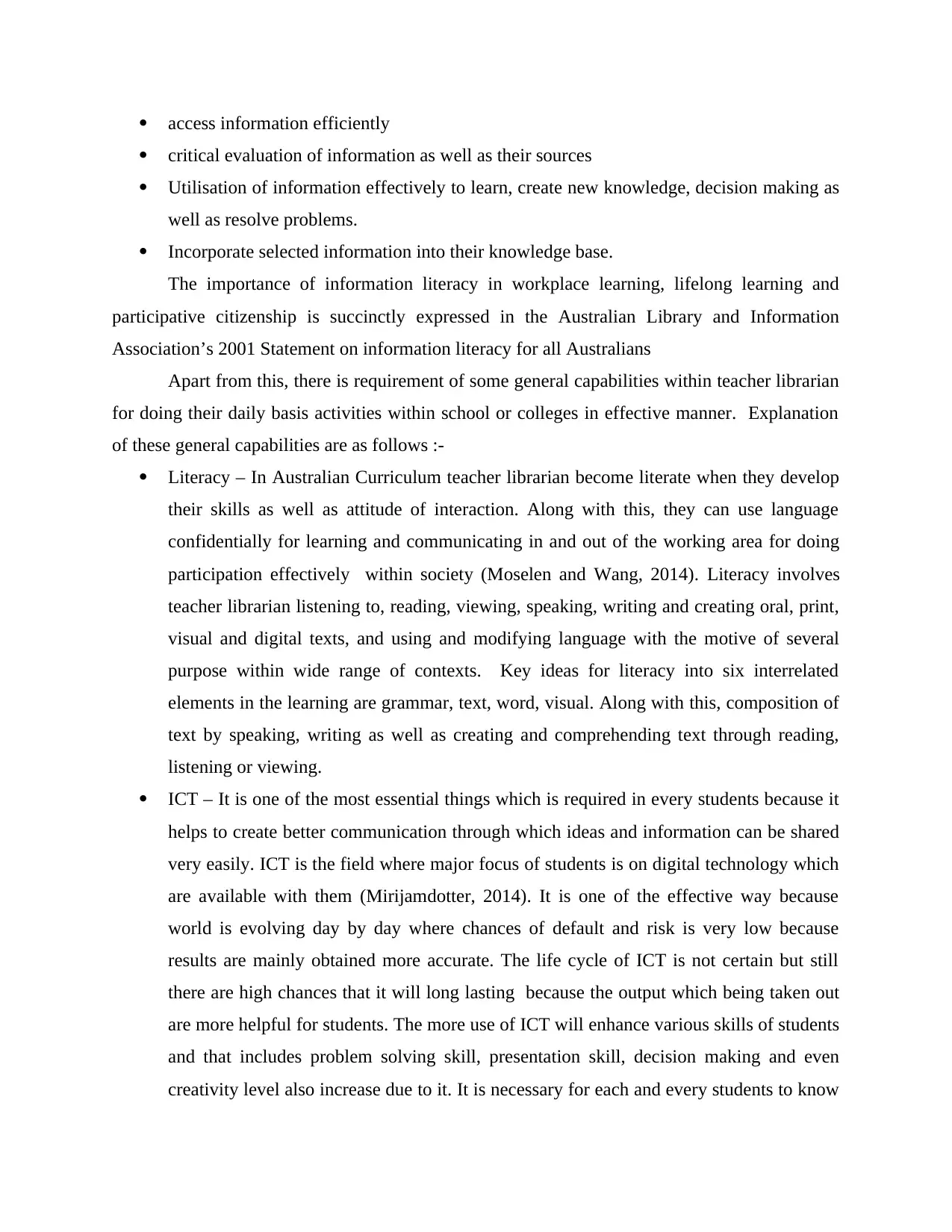
access information efficiently
critical evaluation of information as well as their sources
Utilisation of information effectively to learn, create new knowledge, decision making as
well as resolve problems.
Incorporate selected information into their knowledge base.
The importance of information literacy in workplace learning, lifelong learning and
participative citizenship is succinctly expressed in the Australian Library and Information
Association’s 2001 Statement on information literacy for all Australians
Apart from this, there is requirement of some general capabilities within teacher librarian
for doing their daily basis activities within school or colleges in effective manner. Explanation
of these general capabilities are as follows :-
Literacy – In Australian Curriculum teacher librarian become literate when they develop
their skills as well as attitude of interaction. Along with this, they can use language
confidentially for learning and communicating in and out of the working area for doing
participation effectively within society (Moselen and Wang, 2014). Literacy involves
teacher librarian listening to, reading, viewing, speaking, writing and creating oral, print,
visual and digital texts, and using and modifying language with the motive of several
purpose within wide range of contexts. Key ideas for literacy into six interrelated
elements in the learning are grammar, text, word, visual. Along with this, composition of
text by speaking, writing as well as creating and comprehending text through reading,
listening or viewing.
ICT – It is one of the most essential things which is required in every students because it
helps to create better communication through which ideas and information can be shared
very easily. ICT is the field where major focus of students is on digital technology which
are available with them (Mirijamdotter, 2014). It is one of the effective way because
world is evolving day by day where chances of default and risk is very low because
results are mainly obtained more accurate. The life cycle of ICT is not certain but still
there are high chances that it will long lasting because the output which being taken out
are more helpful for students. The more use of ICT will enhance various skills of students
and that includes problem solving skill, presentation skill, decision making and even
creativity level also increase due to it. It is necessary for each and every students to know
critical evaluation of information as well as their sources
Utilisation of information effectively to learn, create new knowledge, decision making as
well as resolve problems.
Incorporate selected information into their knowledge base.
The importance of information literacy in workplace learning, lifelong learning and
participative citizenship is succinctly expressed in the Australian Library and Information
Association’s 2001 Statement on information literacy for all Australians
Apart from this, there is requirement of some general capabilities within teacher librarian
for doing their daily basis activities within school or colleges in effective manner. Explanation
of these general capabilities are as follows :-
Literacy – In Australian Curriculum teacher librarian become literate when they develop
their skills as well as attitude of interaction. Along with this, they can use language
confidentially for learning and communicating in and out of the working area for doing
participation effectively within society (Moselen and Wang, 2014). Literacy involves
teacher librarian listening to, reading, viewing, speaking, writing and creating oral, print,
visual and digital texts, and using and modifying language with the motive of several
purpose within wide range of contexts. Key ideas for literacy into six interrelated
elements in the learning are grammar, text, word, visual. Along with this, composition of
text by speaking, writing as well as creating and comprehending text through reading,
listening or viewing.
ICT – It is one of the most essential things which is required in every students because it
helps to create better communication through which ideas and information can be shared
very easily. ICT is the field where major focus of students is on digital technology which
are available with them (Mirijamdotter, 2014). It is one of the effective way because
world is evolving day by day where chances of default and risk is very low because
results are mainly obtained more accurate. The life cycle of ICT is not certain but still
there are high chances that it will long lasting because the output which being taken out
are more helpful for students. The more use of ICT will enhance various skills of students
and that includes problem solving skill, presentation skill, decision making and even
creativity level also increase due to it. It is necessary for each and every students to know
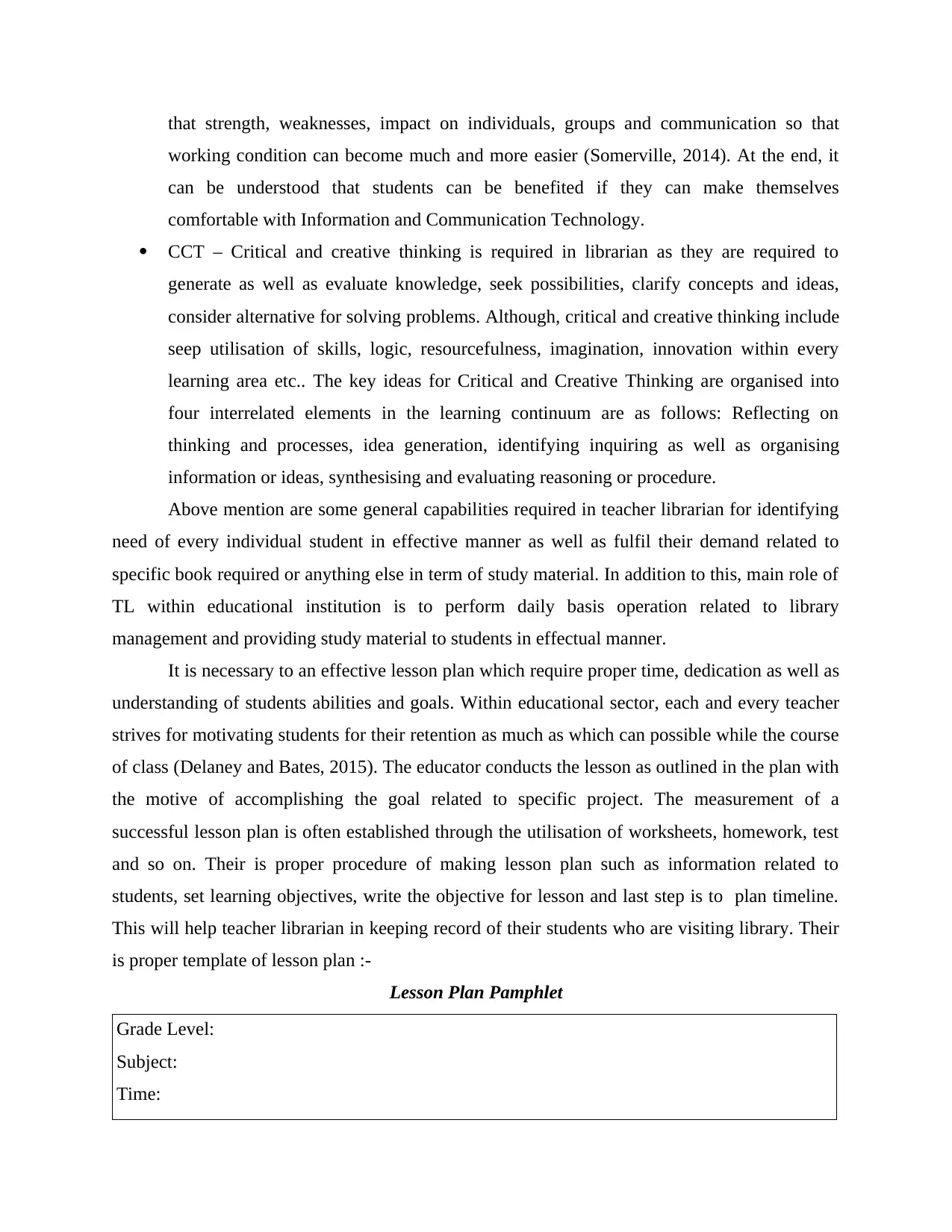
that strength, weaknesses, impact on individuals, groups and communication so that
working condition can become much and more easier (Somerville, 2014). At the end, it
can be understood that students can be benefited if they can make themselves
comfortable with Information and Communication Technology.
CCT – Critical and creative thinking is required in librarian as they are required to
generate as well as evaluate knowledge, seek possibilities, clarify concepts and ideas,
consider alternative for solving problems. Although, critical and creative thinking include
seep utilisation of skills, logic, resourcefulness, imagination, innovation within every
learning area etc.. The key ideas for Critical and Creative Thinking are organised into
four interrelated elements in the learning continuum are as follows: Reflecting on
thinking and processes, idea generation, identifying inquiring as well as organising
information or ideas, synthesising and evaluating reasoning or procedure.
Above mention are some general capabilities required in teacher librarian for identifying
need of every individual student in effective manner as well as fulfil their demand related to
specific book required or anything else in term of study material. In addition to this, main role of
TL within educational institution is to perform daily basis operation related to library
management and providing study material to students in effectual manner.
It is necessary to an effective lesson plan which require proper time, dedication as well as
understanding of students abilities and goals. Within educational sector, each and every teacher
strives for motivating students for their retention as much as which can possible while the course
of class (Delaney and Bates, 2015). The educator conducts the lesson as outlined in the plan with
the motive of accomplishing the goal related to specific project. The measurement of a
successful lesson plan is often established through the utilisation of worksheets, homework, test
and so on. Their is proper procedure of making lesson plan such as information related to
students, set learning objectives, write the objective for lesson and last step is to plan timeline.
This will help teacher librarian in keeping record of their students who are visiting library. Their
is proper template of lesson plan :-
Lesson Plan Pamphlet
Grade Level:
Subject:
Time:
working condition can become much and more easier (Somerville, 2014). At the end, it
can be understood that students can be benefited if they can make themselves
comfortable with Information and Communication Technology.
CCT – Critical and creative thinking is required in librarian as they are required to
generate as well as evaluate knowledge, seek possibilities, clarify concepts and ideas,
consider alternative for solving problems. Although, critical and creative thinking include
seep utilisation of skills, logic, resourcefulness, imagination, innovation within every
learning area etc.. The key ideas for Critical and Creative Thinking are organised into
four interrelated elements in the learning continuum are as follows: Reflecting on
thinking and processes, idea generation, identifying inquiring as well as organising
information or ideas, synthesising and evaluating reasoning or procedure.
Above mention are some general capabilities required in teacher librarian for identifying
need of every individual student in effective manner as well as fulfil their demand related to
specific book required or anything else in term of study material. In addition to this, main role of
TL within educational institution is to perform daily basis operation related to library
management and providing study material to students in effectual manner.
It is necessary to an effective lesson plan which require proper time, dedication as well as
understanding of students abilities and goals. Within educational sector, each and every teacher
strives for motivating students for their retention as much as which can possible while the course
of class (Delaney and Bates, 2015). The educator conducts the lesson as outlined in the plan with
the motive of accomplishing the goal related to specific project. The measurement of a
successful lesson plan is often established through the utilisation of worksheets, homework, test
and so on. Their is proper procedure of making lesson plan such as information related to
students, set learning objectives, write the objective for lesson and last step is to plan timeline.
This will help teacher librarian in keeping record of their students who are visiting library. Their
is proper template of lesson plan :-
Lesson Plan Pamphlet
Grade Level:
Subject:
Time:
⊘ This is a preview!⊘
Do you want full access?
Subscribe today to unlock all pages.

Trusted by 1+ million students worldwide
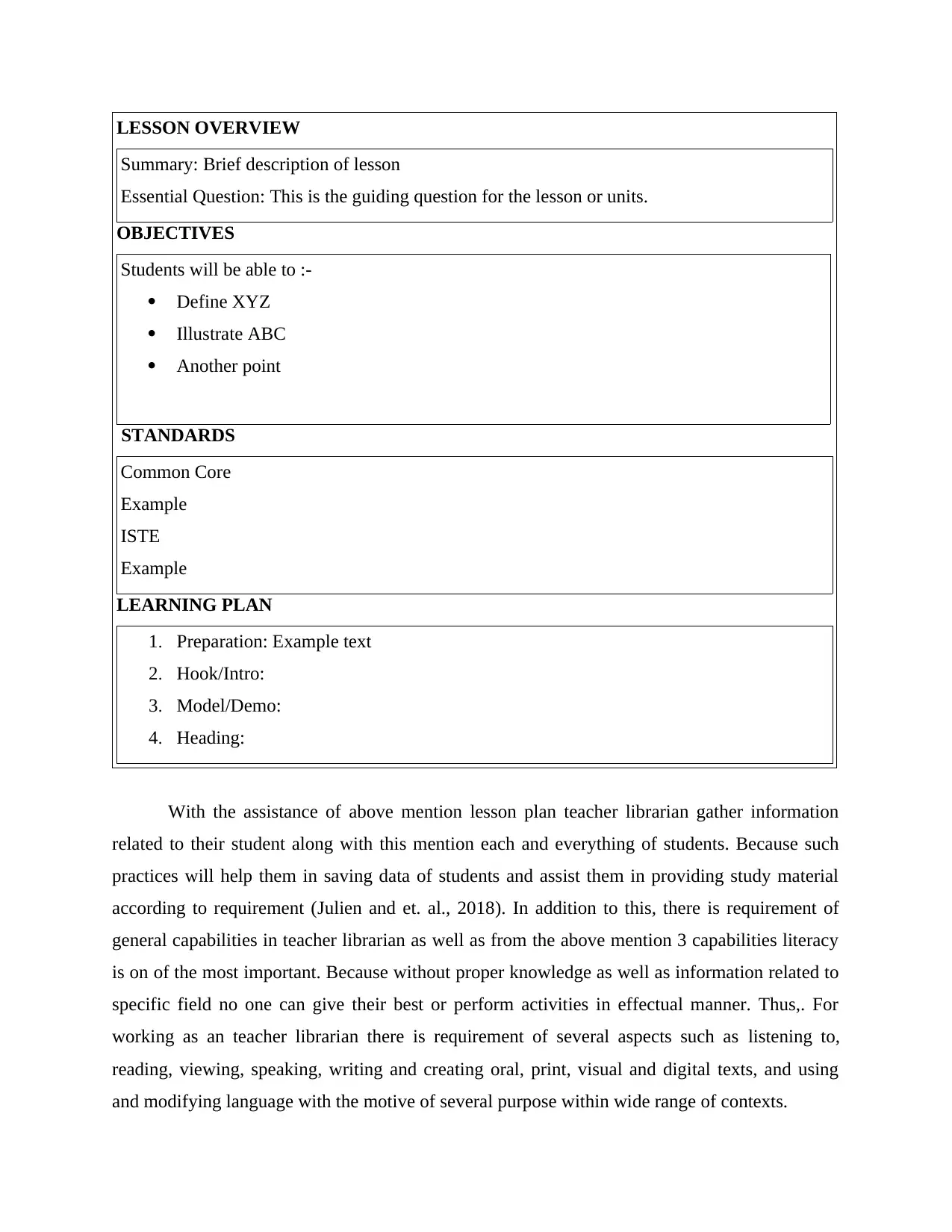
LESSON OVERVIEW
Summary: Brief description of lesson
Essential Question: This is the guiding question for the lesson or units.
OBJECTIVES
Students will be able to :-
Define XYZ
Illustrate ABC
Another point
STANDARDS
Common Core
Example
ISTE
Example
LEARNING PLAN
1. Preparation: Example text
2. Hook/Intro:
3. Model/Demo:
4. Heading:
With the assistance of above mention lesson plan teacher librarian gather information
related to their student along with this mention each and everything of students. Because such
practices will help them in saving data of students and assist them in providing study material
according to requirement (Julien and et. al., 2018). In addition to this, there is requirement of
general capabilities in teacher librarian as well as from the above mention 3 capabilities literacy
is on of the most important. Because without proper knowledge as well as information related to
specific field no one can give their best or perform activities in effectual manner. Thus,. For
working as an teacher librarian there is requirement of several aspects such as listening to,
reading, viewing, speaking, writing and creating oral, print, visual and digital texts, and using
and modifying language with the motive of several purpose within wide range of contexts.
Summary: Brief description of lesson
Essential Question: This is the guiding question for the lesson or units.
OBJECTIVES
Students will be able to :-
Define XYZ
Illustrate ABC
Another point
STANDARDS
Common Core
Example
ISTE
Example
LEARNING PLAN
1. Preparation: Example text
2. Hook/Intro:
3. Model/Demo:
4. Heading:
With the assistance of above mention lesson plan teacher librarian gather information
related to their student along with this mention each and everything of students. Because such
practices will help them in saving data of students and assist them in providing study material
according to requirement (Julien and et. al., 2018). In addition to this, there is requirement of
general capabilities in teacher librarian as well as from the above mention 3 capabilities literacy
is on of the most important. Because without proper knowledge as well as information related to
specific field no one can give their best or perform activities in effectual manner. Thus,. For
working as an teacher librarian there is requirement of several aspects such as listening to,
reading, viewing, speaking, writing and creating oral, print, visual and digital texts, and using
and modifying language with the motive of several purpose within wide range of contexts.
Paraphrase This Document
Need a fresh take? Get an instant paraphrase of this document with our AI Paraphraser
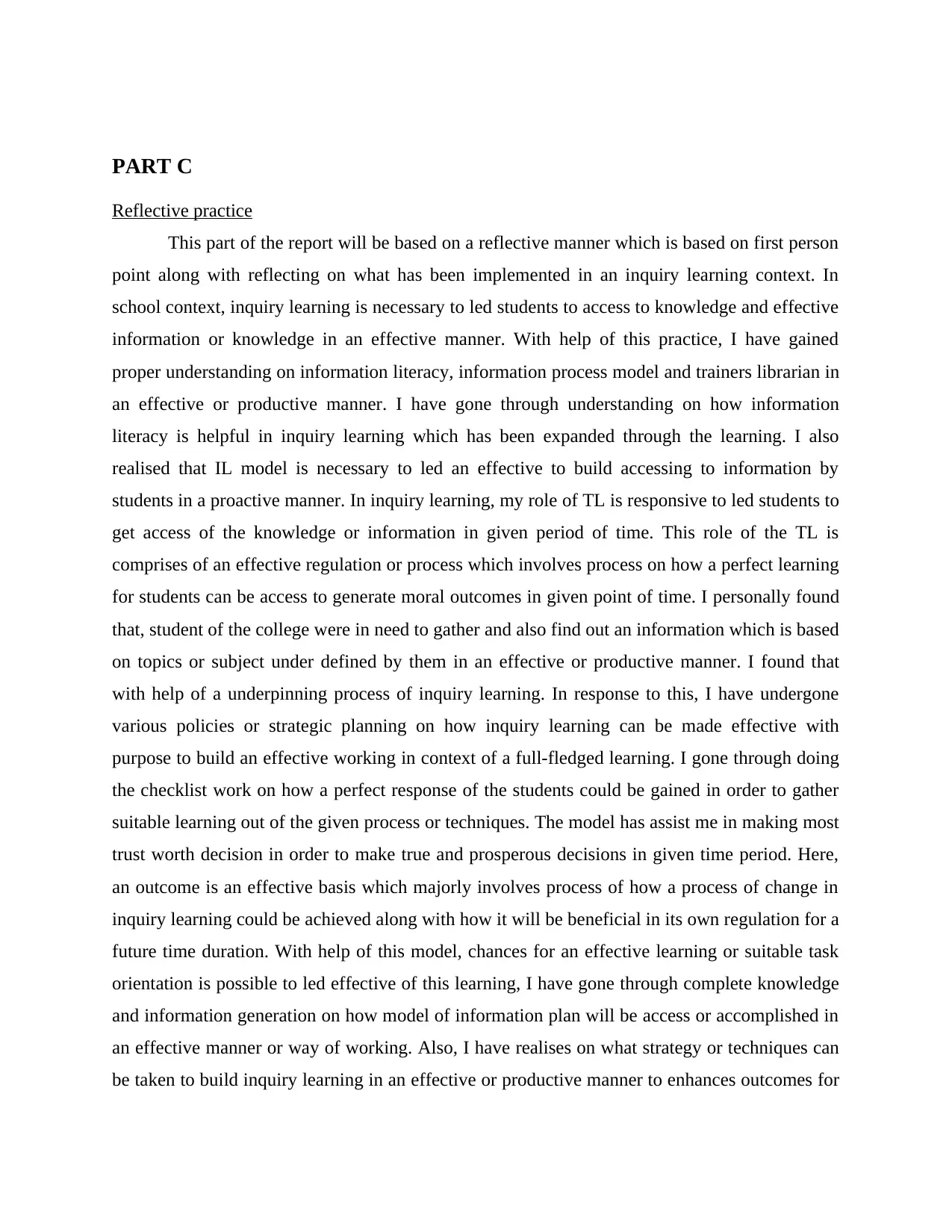
PART C
Reflective practice
This part of the report will be based on a reflective manner which is based on first person
point along with reflecting on what has been implemented in an inquiry learning context. In
school context, inquiry learning is necessary to led students to access to knowledge and effective
information or knowledge in an effective manner. With help of this practice, I have gained
proper understanding on information literacy, information process model and trainers librarian in
an effective or productive manner. I have gone through understanding on how information
literacy is helpful in inquiry learning which has been expanded through the learning. I also
realised that IL model is necessary to led an effective to build accessing to information by
students in a proactive manner. In inquiry learning, my role of TL is responsive to led students to
get access of the knowledge or information in given period of time. This role of the TL is
comprises of an effective regulation or process which involves process on how a perfect learning
for students can be access to generate moral outcomes in given point of time. I personally found
that, student of the college were in need to gather and also find out an information which is based
on topics or subject under defined by them in an effective or productive manner. I found that
with help of a underpinning process of inquiry learning. In response to this, I have undergone
various policies or strategic planning on how inquiry learning can be made effective with
purpose to build an effective working in context of a full-fledged learning. I gone through doing
the checklist work on how a perfect response of the students could be gained in order to gather
suitable learning out of the given process or techniques. The model has assist me in making most
trust worth decision in order to make true and prosperous decisions in given time period. Here,
an outcome is an effective basis which majorly involves process of how a process of change in
inquiry learning could be achieved along with how it will be beneficial in its own regulation for a
future time duration. With help of this model, chances for an effective learning or suitable task
orientation is possible to led effective of this learning, I have gone through complete knowledge
and information generation on how model of information plan will be access or accomplished in
an effective manner or way of working. Also, I have realises on what strategy or techniques can
be taken to build inquiry learning in an effective or productive manner to enhances outcomes for
Reflective practice
This part of the report will be based on a reflective manner which is based on first person
point along with reflecting on what has been implemented in an inquiry learning context. In
school context, inquiry learning is necessary to led students to access to knowledge and effective
information or knowledge in an effective manner. With help of this practice, I have gained
proper understanding on information literacy, information process model and trainers librarian in
an effective or productive manner. I have gone through understanding on how information
literacy is helpful in inquiry learning which has been expanded through the learning. I also
realised that IL model is necessary to led an effective to build accessing to information by
students in a proactive manner. In inquiry learning, my role of TL is responsive to led students to
get access of the knowledge or information in given period of time. This role of the TL is
comprises of an effective regulation or process which involves process on how a perfect learning
for students can be access to generate moral outcomes in given point of time. I personally found
that, student of the college were in need to gather and also find out an information which is based
on topics or subject under defined by them in an effective or productive manner. I found that
with help of a underpinning process of inquiry learning. In response to this, I have undergone
various policies or strategic planning on how inquiry learning can be made effective with
purpose to build an effective working in context of a full-fledged learning. I gone through doing
the checklist work on how a perfect response of the students could be gained in order to gather
suitable learning out of the given process or techniques. The model has assist me in making most
trust worth decision in order to make true and prosperous decisions in given time period. Here,
an outcome is an effective basis which majorly involves process of how a process of change in
inquiry learning could be achieved along with how it will be beneficial in its own regulation for a
future time duration. With help of this model, chances for an effective learning or suitable task
orientation is possible to led effective of this learning, I have gone through complete knowledge
and information generation on how model of information plan will be access or accomplished in
an effective manner or way of working. Also, I have realises on what strategy or techniques can
be taken to build inquiry learning in an effective or productive manner to enhances outcomes for
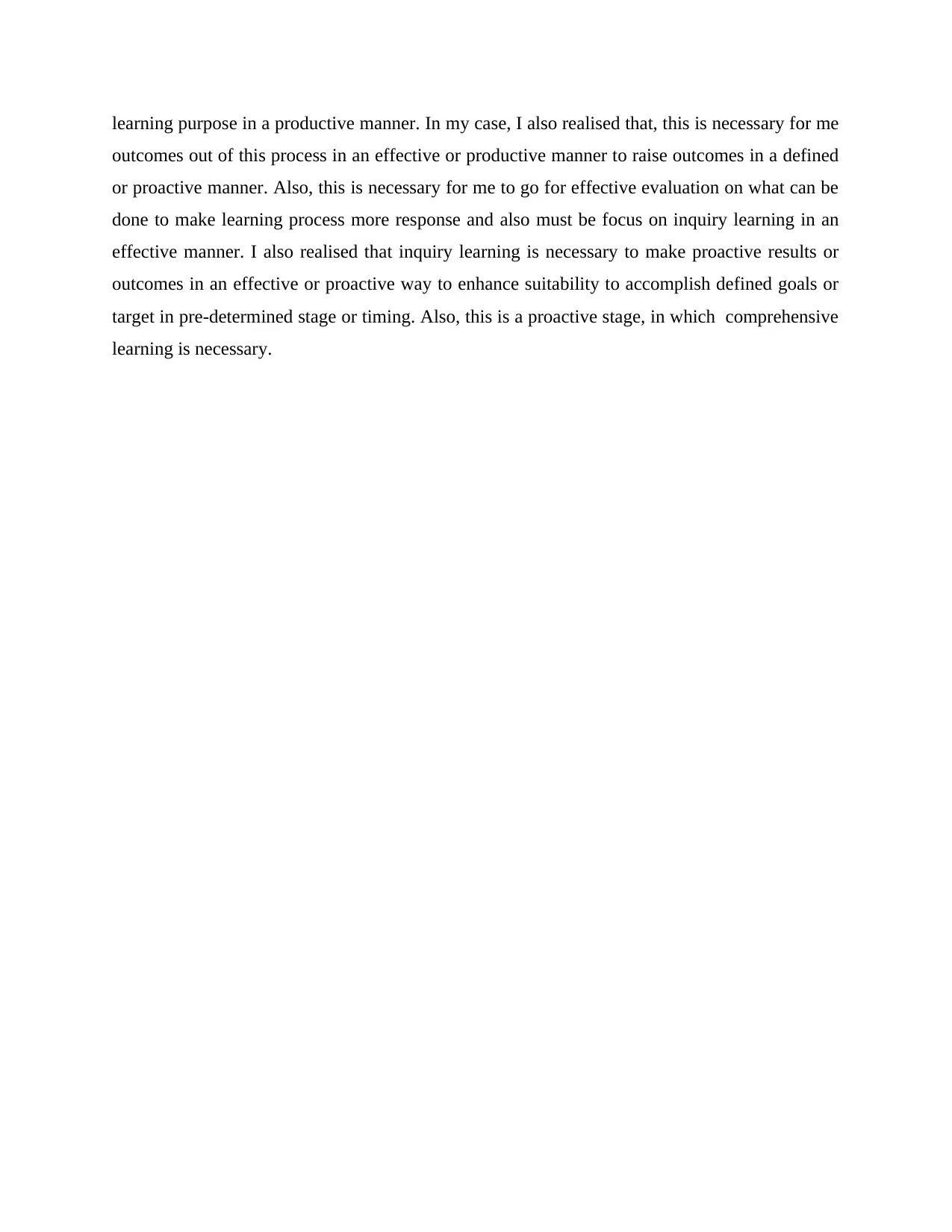
learning purpose in a productive manner. In my case, I also realised that, this is necessary for me
outcomes out of this process in an effective or productive manner to raise outcomes in a defined
or proactive manner. Also, this is necessary for me to go for effective evaluation on what can be
done to make learning process more response and also must be focus on inquiry learning in an
effective manner. I also realised that inquiry learning is necessary to make proactive results or
outcomes in an effective or proactive way to enhance suitability to accomplish defined goals or
target in pre-determined stage or timing. Also, this is a proactive stage, in which comprehensive
learning is necessary.
outcomes out of this process in an effective or productive manner to raise outcomes in a defined
or proactive manner. Also, this is necessary for me to go for effective evaluation on what can be
done to make learning process more response and also must be focus on inquiry learning in an
effective manner. I also realised that inquiry learning is necessary to make proactive results or
outcomes in an effective or proactive way to enhance suitability to accomplish defined goals or
target in pre-determined stage or timing. Also, this is a proactive stage, in which comprehensive
learning is necessary.
⊘ This is a preview!⊘
Do you want full access?
Subscribe today to unlock all pages.

Trusted by 1+ million students worldwide
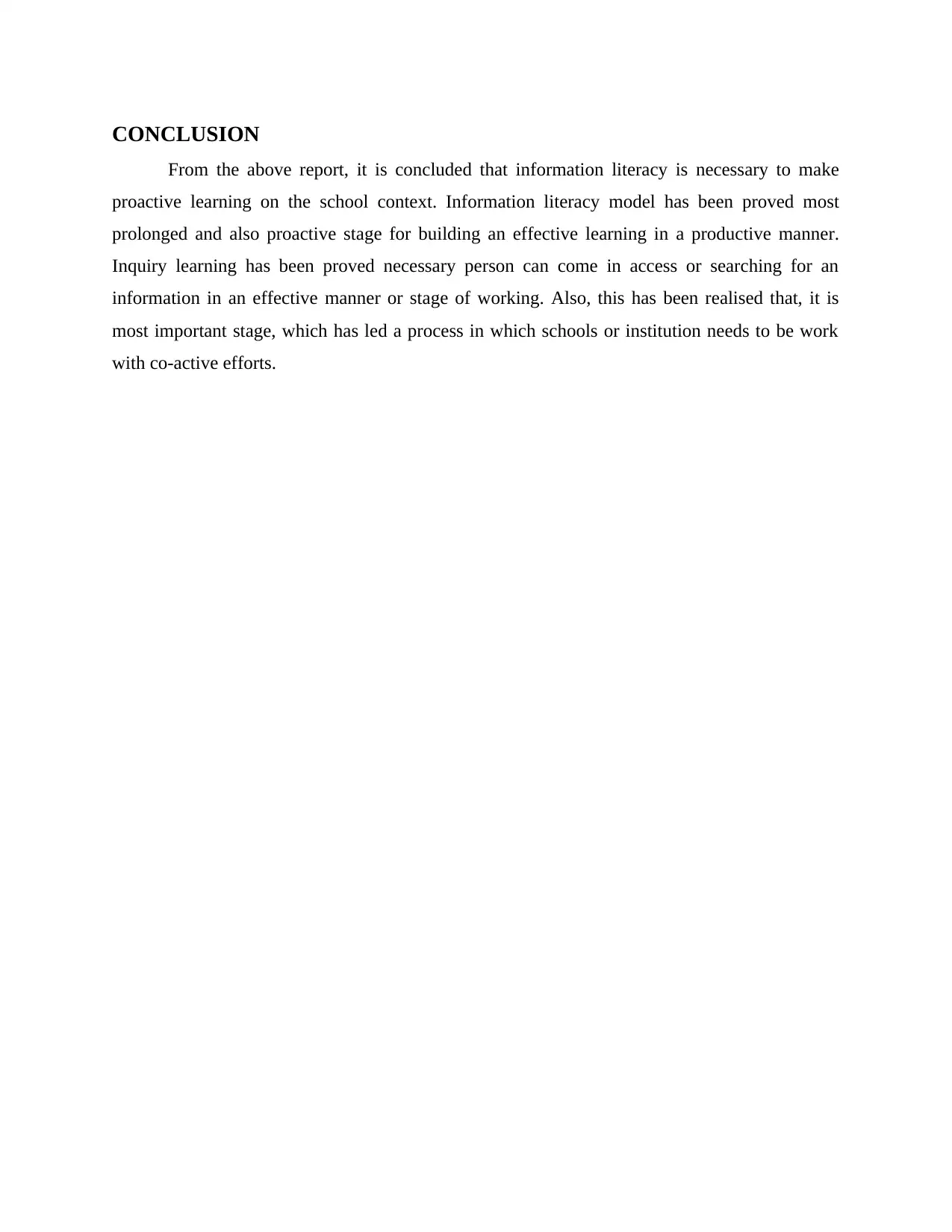
CONCLUSION
From the above report, it is concluded that information literacy is necessary to make
proactive learning on the school context. Information literacy model has been proved most
prolonged and also proactive stage for building an effective learning in a productive manner.
Inquiry learning has been proved necessary person can come in access or searching for an
information in an effective manner or stage of working. Also, this has been realised that, it is
most important stage, which has led a process in which schools or institution needs to be work
with co-active efforts.
From the above report, it is concluded that information literacy is necessary to make
proactive learning on the school context. Information literacy model has been proved most
prolonged and also proactive stage for building an effective learning in a productive manner.
Inquiry learning has been proved necessary person can come in access or searching for an
information in an effective manner or stage of working. Also, this has been realised that, it is
most important stage, which has led a process in which schools or institution needs to be work
with co-active efforts.
Paraphrase This Document
Need a fresh take? Get an instant paraphrase of this document with our AI Paraphraser
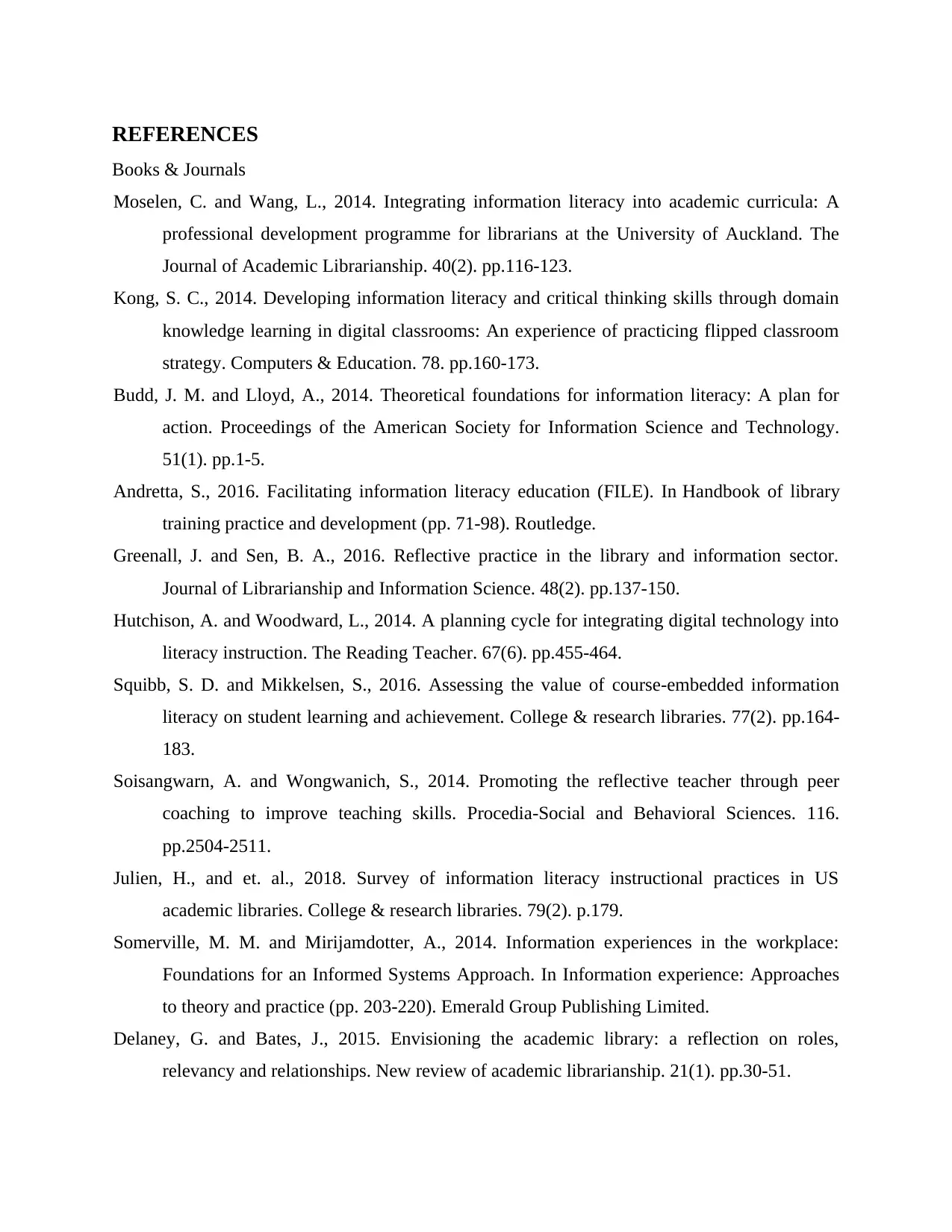
REFERENCES
Books & Journals
Moselen, C. and Wang, L., 2014. Integrating information literacy into academic curricula: A
professional development programme for librarians at the University of Auckland. The
Journal of Academic Librarianship. 40(2). pp.116-123.
Kong, S. C., 2014. Developing information literacy and critical thinking skills through domain
knowledge learning in digital classrooms: An experience of practicing flipped classroom
strategy. Computers & Education. 78. pp.160-173.
Budd, J. M. and Lloyd, A., 2014. Theoretical foundations for information literacy: A plan for
action. Proceedings of the American Society for Information Science and Technology.
51(1). pp.1-5.
Andretta, S., 2016. Facilitating information literacy education (FILE). In Handbook of library
training practice and development (pp. 71-98). Routledge.
Greenall, J. and Sen, B. A., 2016. Reflective practice in the library and information sector.
Journal of Librarianship and Information Science. 48(2). pp.137-150.
Hutchison, A. and Woodward, L., 2014. A planning cycle for integrating digital technology into
literacy instruction. The Reading Teacher. 67(6). pp.455-464.
Squibb, S. D. and Mikkelsen, S., 2016. Assessing the value of course-embedded information
literacy on student learning and achievement. College & research libraries. 77(2). pp.164-
183.
Soisangwarn, A. and Wongwanich, S., 2014. Promoting the reflective teacher through peer
coaching to improve teaching skills. Procedia-Social and Behavioral Sciences. 116.
pp.2504-2511.
Julien, H., and et. al., 2018. Survey of information literacy instructional practices in US
academic libraries. College & research libraries. 79(2). p.179.
Somerville, M. M. and Mirijamdotter, A., 2014. Information experiences in the workplace:
Foundations for an Informed Systems Approach. In Information experience: Approaches
to theory and practice (pp. 203-220). Emerald Group Publishing Limited.
Delaney, G. and Bates, J., 2015. Envisioning the academic library: a reflection on roles,
relevancy and relationships. New review of academic librarianship. 21(1). pp.30-51.
Books & Journals
Moselen, C. and Wang, L., 2014. Integrating information literacy into academic curricula: A
professional development programme for librarians at the University of Auckland. The
Journal of Academic Librarianship. 40(2). pp.116-123.
Kong, S. C., 2014. Developing information literacy and critical thinking skills through domain
knowledge learning in digital classrooms: An experience of practicing flipped classroom
strategy. Computers & Education. 78. pp.160-173.
Budd, J. M. and Lloyd, A., 2014. Theoretical foundations for information literacy: A plan for
action. Proceedings of the American Society for Information Science and Technology.
51(1). pp.1-5.
Andretta, S., 2016. Facilitating information literacy education (FILE). In Handbook of library
training practice and development (pp. 71-98). Routledge.
Greenall, J. and Sen, B. A., 2016. Reflective practice in the library and information sector.
Journal of Librarianship and Information Science. 48(2). pp.137-150.
Hutchison, A. and Woodward, L., 2014. A planning cycle for integrating digital technology into
literacy instruction. The Reading Teacher. 67(6). pp.455-464.
Squibb, S. D. and Mikkelsen, S., 2016. Assessing the value of course-embedded information
literacy on student learning and achievement. College & research libraries. 77(2). pp.164-
183.
Soisangwarn, A. and Wongwanich, S., 2014. Promoting the reflective teacher through peer
coaching to improve teaching skills. Procedia-Social and Behavioral Sciences. 116.
pp.2504-2511.
Julien, H., and et. al., 2018. Survey of information literacy instructional practices in US
academic libraries. College & research libraries. 79(2). p.179.
Somerville, M. M. and Mirijamdotter, A., 2014. Information experiences in the workplace:
Foundations for an Informed Systems Approach. In Information experience: Approaches
to theory and practice (pp. 203-220). Emerald Group Publishing Limited.
Delaney, G. and Bates, J., 2015. Envisioning the academic library: a reflection on roles,
relevancy and relationships. New review of academic librarianship. 21(1). pp.30-51.
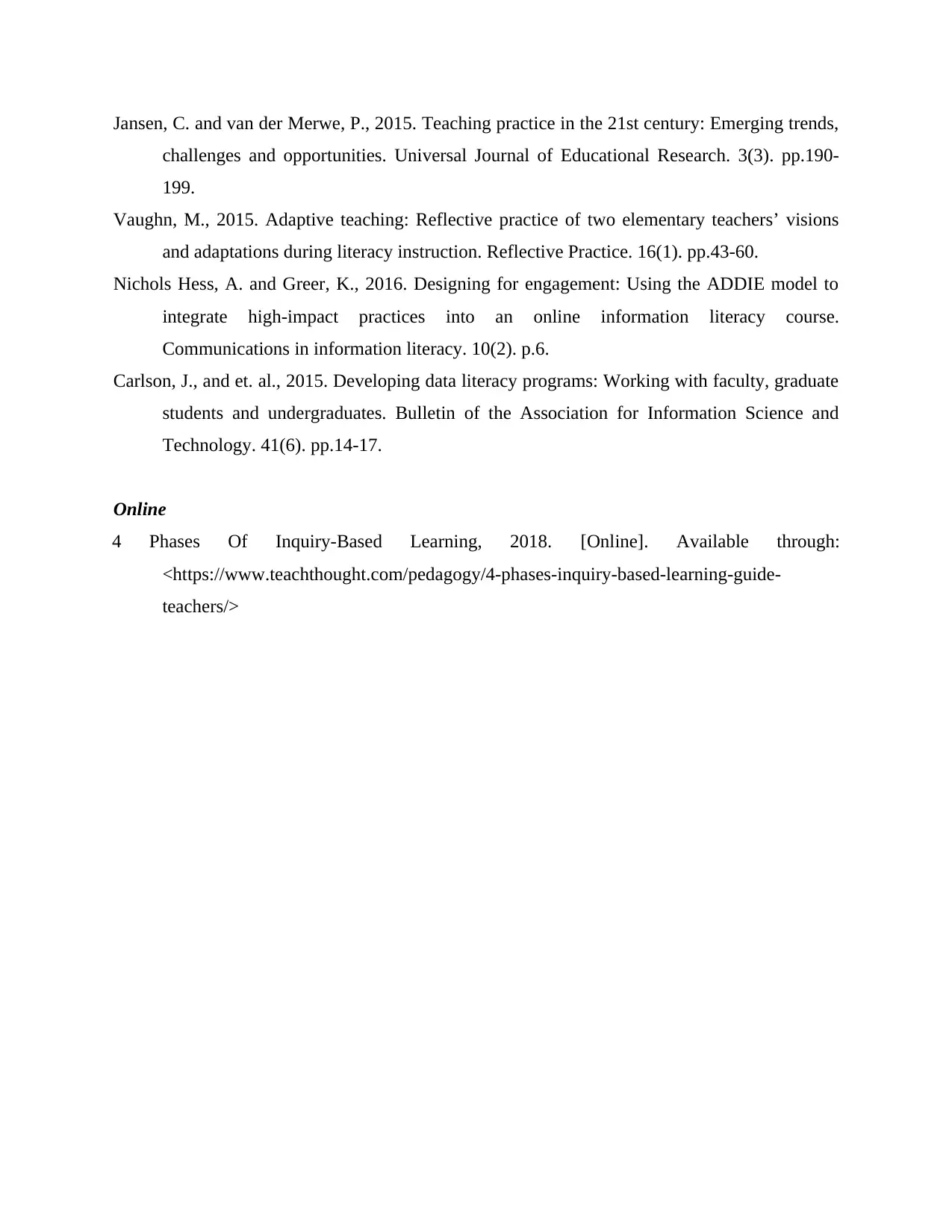
Jansen, C. and van der Merwe, P., 2015. Teaching practice in the 21st century: Emerging trends,
challenges and opportunities. Universal Journal of Educational Research. 3(3). pp.190-
199.
Vaughn, M., 2015. Adaptive teaching: Reflective practice of two elementary teachers’ visions
and adaptations during literacy instruction. Reflective Practice. 16(1). pp.43-60.
Nichols Hess, A. and Greer, K., 2016. Designing for engagement: Using the ADDIE model to
integrate high-impact practices into an online information literacy course.
Communications in information literacy. 10(2). p.6.
Carlson, J., and et. al., 2015. Developing data literacy programs: Working with faculty, graduate
students and undergraduates. Bulletin of the Association for Information Science and
Technology. 41(6). pp.14-17.
Online
4 Phases Of Inquiry-Based Learning, 2018. [Online]. Available through:
<https://www.teachthought.com/pedagogy/4-phases-inquiry-based-learning-guide-
teachers/>
challenges and opportunities. Universal Journal of Educational Research. 3(3). pp.190-
199.
Vaughn, M., 2015. Adaptive teaching: Reflective practice of two elementary teachers’ visions
and adaptations during literacy instruction. Reflective Practice. 16(1). pp.43-60.
Nichols Hess, A. and Greer, K., 2016. Designing for engagement: Using the ADDIE model to
integrate high-impact practices into an online information literacy course.
Communications in information literacy. 10(2). p.6.
Carlson, J., and et. al., 2015. Developing data literacy programs: Working with faculty, graduate
students and undergraduates. Bulletin of the Association for Information Science and
Technology. 41(6). pp.14-17.
Online
4 Phases Of Inquiry-Based Learning, 2018. [Online]. Available through:
<https://www.teachthought.com/pedagogy/4-phases-inquiry-based-learning-guide-
teachers/>
⊘ This is a preview!⊘
Do you want full access?
Subscribe today to unlock all pages.

Trusted by 1+ million students worldwide
1 out of 12
Related Documents
Your All-in-One AI-Powered Toolkit for Academic Success.
+13062052269
info@desklib.com
Available 24*7 on WhatsApp / Email
![[object Object]](/_next/static/media/star-bottom.7253800d.svg)
Unlock your academic potential
Copyright © 2020–2025 A2Z Services. All Rights Reserved. Developed and managed by ZUCOL.





